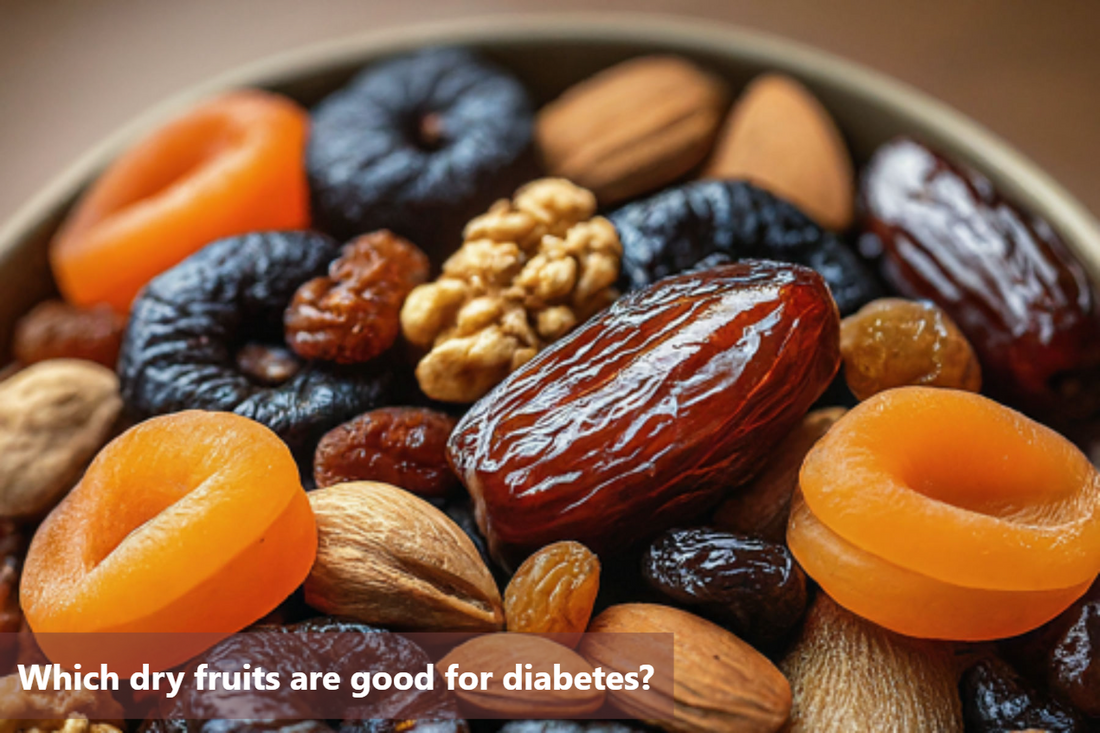Dry fruits are a convenient and tasty snacking option for everyone. However, for diabetic patients it is imperative to also understand the nutritional content behind them. Managing blood sugar levels is crucial for individuals with diabetes to prevent complications such as heart disease, nerve damage, and vision problems.
When it comes to incorporating dry fruits into a diabetes-friendly diet, it's essential to consider their impact on blood sugar levels. While some dry fruits are packed with nutrients and have a low glycemic index, making them suitable for individuals with diabetes, others may be higher in natural sugars and should be consumed in moderation.
Understanding which dry fruits are beneficial and which ones should be approached with caution is essential to make informed dietary choices and effectively manage their health and condition.
Benefits of Dry Fruits for Diabetes
Dry fruits possess an array of essential nutrients, including vitamins, minerals, and fiber, making them a valuable addition to a diabetic diet. The low glycemic index of many dry fruits ensures a slower, sustained release of sugar into the bloodstream, preventing rapid spikes in blood glucose levels.
Nutrient Density: Dry fruits are packed with essential nutrients, including vitamins, minerals, and fiber. These nutrients are vital for overall health and help manage various bodily functions, including blood sugar regulation.
Fiber Content: Dry fruits are typically high in dietary fiber, which helps slow down the digestion and better absorption of carbs. This leads to a gradual increase in blood sugar levels promoting better blood sugar control.
Healthy Fats: Many dry fruits, such as almonds, walnuts, and pistachios, are rich in heart-healthy fats, including monounsaturated and polyunsaturated fats. These help improve cholesterol levels and reduce the risk of cardiovascular disease.
Antioxidants: Dry fruits are often rich in antioxidants, which is associated with various health benefits, including reduced inflammation and improved insulin sensitivity.
Portability and Convenience: Dry fruits are shelf-stable and portable, making them a convenient snack option for diabetic patients. They can be easily carried and consumed on the go, providing a quick source of energy and nutrients without the need for refrigeration or preparation.
Blood Sugar Control: While dry fruits do contain carbs, they typically have a lower glycemic index compared to sugary snacks and desserts. Choosing dry fruits over high-glycemic foods may help stabilize blood sugar levels and reduce the risk of postprandial spikes.
Best Dry Fruits for Diabetes
Dry fruits are a popular choice for individuals with diabetes due to their natural sweetness, fiber content, and essential nutrients.
Walnuts: These are rich in omega-3 fatty acids, which helps improve heart health and reduces the risk of complications. They also offer a good dose of protein and fiber, making them a satisfying snack.
Almonds: High in protein, fiber, and healthy fats, almonds have a minimal impact on blood sugar levels. They also provide important vitamins and minerals, including magnesium, which may help regulate blood sugar.
Pistachios: With a lower calorie content compared to other nuts, pistachios offer a good source of protein, fiber, and antioxidants. They have been linked to improved glycemic control and reduced inflammation in individuals with diabetes.
Dried Berries: Blueberries, cranberries, and raspberries are rich in antioxidants and fiber. The natural sugars in dried berries are less concentrated than in other dried fruits, making them a favorable option for individuals managing diabetes.
Chia Seeds: While not a traditional dry fruit, chia seeds are packed with fiber, omega-3 fatty acids, and protein. They can be added to smoothies, yogurt, or oatmeal for a diabetes-friendly boost.
Worst Dry Fruits for Diabetes
It's crucial to be aware of which varieties may have a negative impact on blood sugar levels and hence should be consumed with caution or avoided.
Raisins: Although high in fiber and antioxidants, they can significantly raise blood sugar due to their concentrated natural sugars.
Dates: Despite their nutritional benefits, dates are packed with carbs, which can cause a rapid spike in blood glucose levels.
Dried mango: Despite being a rich source of vitamins and minerals, dried mango contains high levels of sugar and should be consumed in minimal amounts.
Dried pineapples: Although they contain enzymes and nutrients, are also high in natural sugars, which can lead to rapid elevation of blood sugar levels, making them unsuitable for those with diabetes.
-
Dried bananas: They are high in sugar and carbohydrates and can cause a considerable impact on blood glucose levels.
For diabetic patients, it's advisable to be mindful of the portions and frequency when consuming these dry fruits. While they do offer nutritional benefits, their impact on blood sugar levels necessitates prudent consumption.
Food
Serving Size
Caloric Content (Range)
Raisins
1/2 cup
54-66
Apricots
1/2 cup
30-32
Prunes
1/2 cup
29
Figs
1/2 cup
61
Almonds
1 cup
15
Cashews
100 g
15
Peaches
100 g
35
Walnuts
100 g
15
Sultanas
100 g
51-52
Dried apples
100 g
29
Pistachios
100 g
15
Dates
100 mg
63
It's important to pay attention to portion sizes when consuming these dry fruits, as overindulging can still lead to an increase in blood sugar levels. Incorporating a variety of these dry fruits into a balanced diet can contribute to better diabetes management.Diabetes can be managed effectively by incorporating the right types of dry fruits into a balanced diet plan. When it comes to including dry fruits in a diabetes-friendly diet, it’s important to make informed choices. Certain dry fruits offer valuable nutrients and can help in managing blood sugar levels, while others may have to be consumed in moderation or avoided.
This Blog post is an initiative by DiabeSmart, to provide accurate and Nutritionist / Doctor approved information related to Diabetes. DiabeSmart is India's first Food brand designed specifically for Diabetics, that has been clinically tested on Diabetics and Pre-Diabetics to deliver 55% - 70% lower Sugar spikes. DiabeSmart is part of Lo! Foods - India's leading brand for Everyday Functional Health foods.













